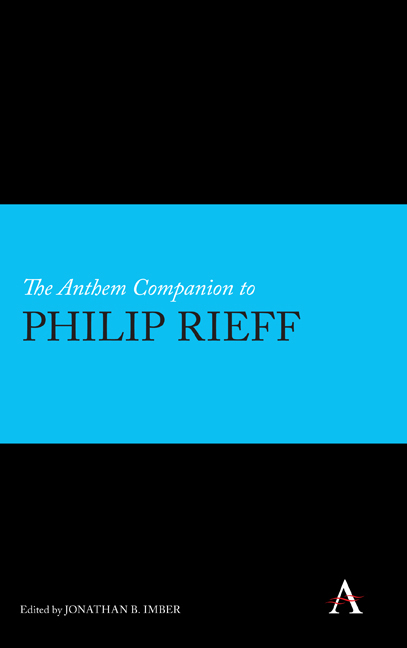Book contents
- Frontmatter
- Contents
- Introduction
- Chapter 1 Philip Rieff: Some Reflections
- Chapter 2 Philip Rieff and the Impossible Culture
- Chapter 3 Philip Rieff as Cultural Critic
- Chapter 4 Philip Rieff as Teacher
- Chapter 5 Prophet v. Stoic: Philip Rieff's Case against Freud
- Chapter 6 Decline and Fall in the Work of Philip Rieff: “I love the old questions” Beckett, Endgame
- Chapter 7 Philip Rieff as Social/ Cultural Theorist
- Chapter 8 Fellow Sons
- Chapter 9 Philip Rieff and Social Theory
- Chapter 10 A Kindly Apocalypse: Philip Rieff and the Endgame of the Therapeutic
- Chapter 11 Disenchantment, Authenticity and Ordinary Charisma
- Writings of Philip Rieff
- List of Contributors
- Index
Chapter 1 - Philip Rieff: Some Reflections
Published online by Cambridge University Press: 21 June 2018
- Frontmatter
- Contents
- Introduction
- Chapter 1 Philip Rieff: Some Reflections
- Chapter 2 Philip Rieff and the Impossible Culture
- Chapter 3 Philip Rieff as Cultural Critic
- Chapter 4 Philip Rieff as Teacher
- Chapter 5 Prophet v. Stoic: Philip Rieff's Case against Freud
- Chapter 6 Decline and Fall in the Work of Philip Rieff: “I love the old questions” Beckett, Endgame
- Chapter 7 Philip Rieff as Social/ Cultural Theorist
- Chapter 8 Fellow Sons
- Chapter 9 Philip Rieff and Social Theory
- Chapter 10 A Kindly Apocalypse: Philip Rieff and the Endgame of the Therapeutic
- Chapter 11 Disenchantment, Authenticity and Ordinary Charisma
- Writings of Philip Rieff
- List of Contributors
- Index
Summary
One of Philip Rieff's favourite paintings was Poussin's The Adoration of the Golden Calf, in the National Gallery in London. It shows an angry Moses thundering down the mountain about to dash the stone tablets of the law to pieces in outrage at his fickle people dancing around and worshipping a huge statue of a golden calf. Rieff strongly identified with this Moses, the bearer of the law – the Thou Shalt Nots – sent from God. In Poussin's scene, the people renounce the authority of the Old Testament divinity and turn to the leisurely fun of dancing and feasting, worshipping a pagan pleasure god. Poussin had provided an uncanny parable for Rieff's own working life.
To my mind, the most striking thing about Rieff's work, when one stands back to take stock, is the deadly seriousness with which it takes culture, and the role of the cultural elites, or the clerisy – its custodians. Culture is the housing structure for God, and his later sublimations – a structure without which he could not exist. Rieff stands diametrically opposite to the mainstream of the times, which set about deconstructing culture, turning it from the central bearer of the truths that matter to a mask for power, exploitation and disadvantage. The task of culture for Rieff is to enchant and repress; the task for most of his academic contemporaries was to disenchant and liberate.
Rieff's work is also compelling because of its intellectual virtuosity, its originality, its blend of analytical insight and grander theme, and for the farrago of brilliant aphorisms peppered through it. There are types of intelligence and lucidity that have their own charisma.
There was a teaching virtuosity too. His students – of which I was never one – report the painstaking care with which he would proceed through his chosen texts. In 1980 he delivered a two- hour lecture as the finale to a Sociology of Culture Conference at my university in Melbourne. The title would have surprised no one familiar with his later work: ‘Authority and Culture’. In a darkened room, speaking without notes, he held the audience spellbound, mesmerized by an entirely new experience, even though 90 per cent of the 200 present would have found the content an appalling anathema – if they had understood it – proclaimed in raw- edged violation of almost everything intellectual they held dear.
- Type
- Chapter
- Information
- The Anthem Companion to Philip Rieff , pp. 5 - 22Publisher: Anthem PressPrint publication year: 2018

